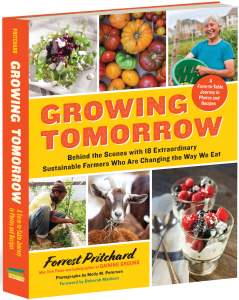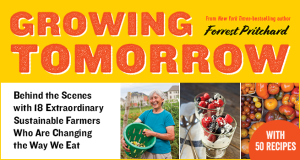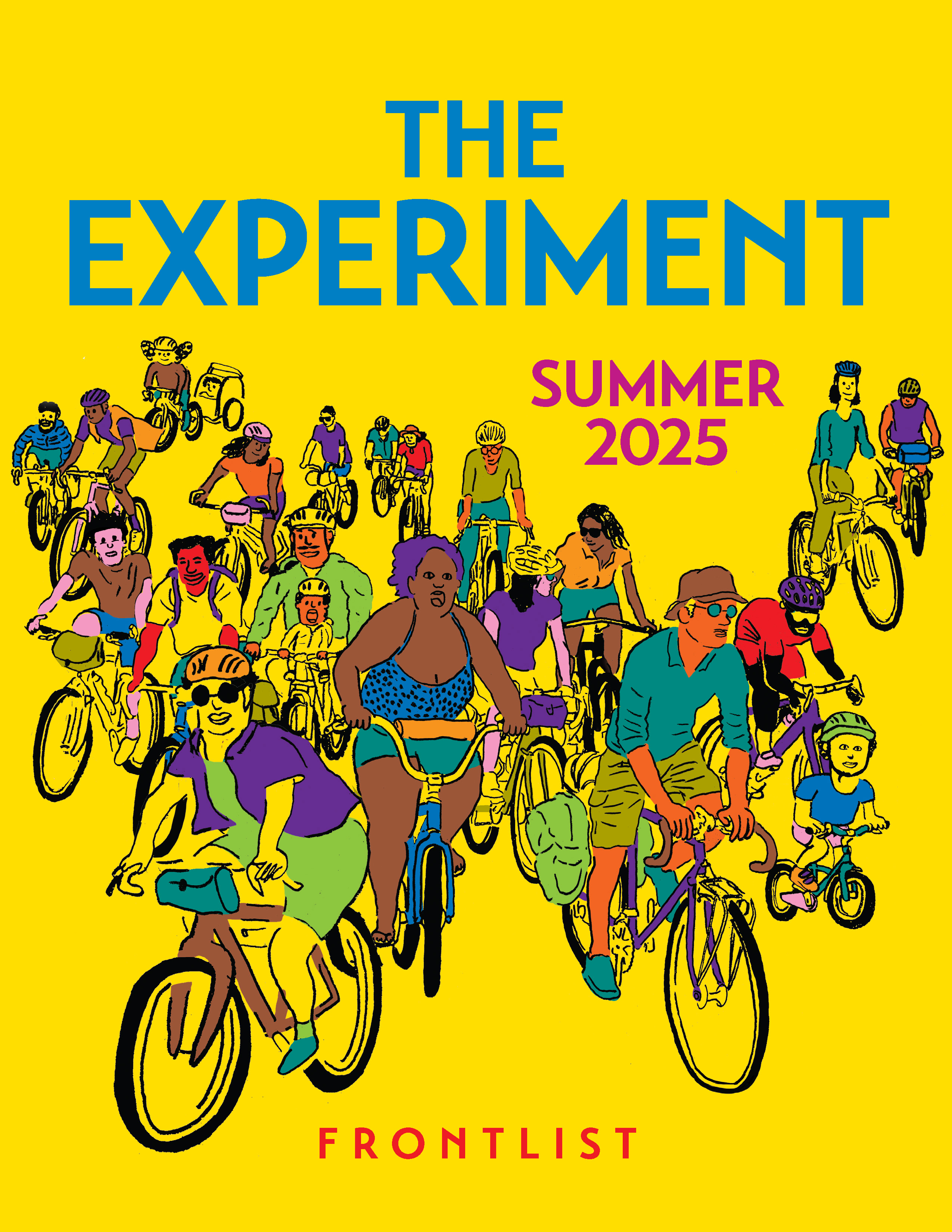Happy Publication Day to Forrest Pritchard and his newest book, Growing Tomorrow: A Farm-to-Table Journey in Photos and Recipes—Behind the Scenes with 18 Extraordinary Sustainable Farmers Who Are Changing the Way We Eat. When Forrest Pritchard published his first book, Gaining Ground, a book about his adventures building his family’s failing farm back into a successful business, his story struck a chord with readers all over the country. The book became a New York Times bestseller and Forrest asked himself, “If one small farm could inspire such a response, what might happen if we multiplied that number?” Growing Tomorrow is the result. Here, he chronicles the stories of eighteen visionary farmers across the country.
A Farm-to-Table Journey in Photos and Recipes
Behind the Scenes with 18 Extraordinary Sustainable Farmers Who Are Changing the Way We Eat
by Forrest Pritchard and Molly M. Peterson
In honor of Growing Tomorrow‘s official publication, we spoke with Forrest Pritchard about his inspiration for and experience in writing the book.
 Q: What inspired you to write Growing Tomorrow?
Q: What inspired you to write Growing Tomorrow?
Forrest: When you think about your favorite memories, what do you recall? For me, it’s family and friends, and laughter, usually associated with food! Mom’s cooking, or one of those nights where everyone is gathered around the table, in no hurry whatsoever. Food is often a celebration, something that unites us and brings us closer together. Being a farmer myself, and knowing other farmers as well as I do, that was my biggest inspiration: that food has the power to bring us together around the table, to slow down for a couple of hours, to remember to be happy.
Q: You visited 18 farmers across the country—how did you choose which farms you would include in the book?
Forrest: I wanted readers to be able to pick up the book and immediately identify themselves, and their communities, represented within the chapters. It’s so important to understand that this type of food—local, wholesome, fresh produce—can be successfully and sustainably grown throughout America, just so long as customers support it! In this spirit, I set out to find different faces, genders, ages, locations, and even generations. By the time the last page is turned, readers will see Growing Tomorrow is a thoroughly American story.
Q: Tell us about the experience of learning the farmers’ stories so you could write about them. Was it difficult to get the farmers to talk about their failures and frustrations?
Forrest: Yes, farmers are so shy! And that stands to reason, they spend most of their days out in the fields, away from other people. But farmers are some of the most generous people on the planet; otherwise, why would they spend their lives growing food for complete strangers? The warmth and generosity of these farmers comes through in Molly Peterson’s photos… you can’t fake smiles like the ones she was able to capture.

Q: Your book is full of recipes that the farmers contributed. What was the process of gathering them like and how did you make the selections?
Forrest: I started thinking one day, “Hey, aren’t farmers the original food experts?” Everyone has a favorite recipe or two, a favorite dish, and farmers are no exception. So when it came to coaxing a few suggestions out of our group, the biggest challenge was actually getting them to put it in writing and send it our way! But the recipes in Growing Tomorrow speak for themselves: simple, fresh, and there’s truly something for everyone here.
Q: You’re a 7th generation farmer yourself and have a working farm in Virginia. What did you learn from the process of writing the book that has influenced your own farming, or your perspective on your own business?
Forrest: Whether we pause to think about it or not, how deeply connected we all are to the land. Show of hands, how many of you ate food today? That proves my point: If you eat, then you are invested in farming, pure and simple. And when we embrace this attitude, that food connects us and unites us, then it changes our entire point of view, the choices we make, and the impact we can have on our health, our economy, our environment. That’s what I learned more than anything, that despite our differences, we’re so very connected to the ground beneath our feet.
 Q: What was your collaboration with photographer Molly Peterson like?
Q: What was your collaboration with photographer Molly Peterson like?
Forrest: Have you ever road-tripped with someone for five straight months and liked them even more when the trip was over? Ha, that was what it was like! Molly grew up outside of Chicago, moved with her husband to Colorado to study photography and culinary arts, then together they moved to Virginia to successfully run an old cattle farm a few hours south of me. What can you say about a person who can do all that? She brought out the best in the farmers that we visited, and the evidence shines from the pages.
Q: Your first book, Gaining Ground, a memoir about saving your family’s farm, struck a chord with readers and through word of mouth hit the New York Times bestseller list many months after publication date. What is it people have responded to in particular?
Forrest: You’ve heard of Slow Food? Well, Gaining Ground is the first Slow Book! In all seriousness, I think people see that sustainable farming is so deeply inclusive… good for the farmers, consumers and the environment alike. Once you “get it”—for example, that growing homegrown tomatoes is so much cooler than ogling a Mercedes Benz—well… pretty soon you have people taking selfies with freshly picked vegetables! And let’s face it, that’s pretty awesome.
Q: Farmers markets are an intrinsic part of the business for many of your farmers. What can you tell us about the relationships you witnessed between farmer and the farmers markets, as well as between farmer and the consumer? What have been your own experiences with Smith Meadows?
Forrest: Farmers’ markets are an ancient part of our society, dating back thousands of years. Ever since we’ve had cities, we’ve had farmers’ markets. So when people suggest these markets are “trendy,” it really gives me a chuckle! So, there’s always been a desire to connect with the freshest, tastiest, most nutritious food, it’s ingrained in us. For example, you know right away when something tastes fresh, or tastes old and stale, right? It’s natural. So, whether it’s at my own stand, buying eggs in Virginia, or for customers in California purchasing fresh citrus, we all want the same thing. Superior food, with an honest, authentic story.
Q: There is lots of conflicting information about food constantly in the news—buy organic, buy local, etc. What is your perspective on this?
Forrest: As a culture, I think we’re geniuses when it comes to missing the bigger picture, especially concerning food. I think there should be a Food Blogger prize: the Hey, You Missed the Entire Point! Award. For example, we often comment how “expensive” organic food is. But when was the last time you heard someone ask, “Hmm, why is most of our food so darn cheap?” Logically, it only makes sense to talk about “expensive” food when contrasting it with cheap food. So, by taking an honest look at how our food is raised, it changes our entire perspective; the word “expensive” quickly turns into “value” or even “bargain.” As a farmer who sells directly to the public, I witness this all the time.

Q: Given all the risk, the daily challenges and endless hard work—why do you think people choose to become farmers? What advice would you give a young person who’s interested in pursuing that career? And is it possible if it’s not a family business that’s being handed down?
Forrest: Great question, and these reasons are probably why more people aren’t farmers. I think regardless of whether it’s one acre or one thousand, farmers are united with a desire to care for the land, the calm feeling of independence, and the faith that they’re contributing to something greater than themselves. I mean, how many things can you list in life that are more important than growing healthy food for your family and your neighbors? For a young person starting out, I’d say, “Absolutely, go for it, there are 400 million Americans, and they all need to eat.” Talk about job security! And now more than ever, there are so many alternatives to owning your own land. For example, two of the successful farmers in Growing Tomorrow own no land at all!
Q: You’re embarking on an unusual book tour this fall—what can you tell us about that?
Forrest: Look, here’s a book filled with beautiful photos, wonderful recipes, and inspiring stories… what a joy, you can go anywhere! So this fall I’ll be in Oregon, Georgia, DC and New York at food and harvest festivals and bookstores, then next summer (2016) I’m planning a two month national tour of farmers’ markets, revisiting all the farmers in the book at their local markets.
Q: What do you hope readers will take away from reading this book?
Forrest: That we’re all connected, that we’re all a community. That we need to take care of one another, as well as our world. Certainly, you can do this all yourself; you can grow your own food in your backyard, on your patio, or in your community garden. Be proud to cultivate your own vegetables, celebrate your accomplishment! But for those things that you can’t grow? Support your local farmers. Value their work, their hard won wisdom. We’re a community. At the end of the day, we’re so much stronger united than alone.
Q: Can you tell us anything about your next project?
Forrest: When you get right down to it—I mean, really get down to the basics—there are only a few things we need as humans: Food, love and shelter. But sometimes, life gets in the way, and we get a little off track, a little mixed up. And that’s okay, that’s totally normal. So instead of food, love and shelter, I’m writing about food, love and stupidity. With any luck, it’ll be in bookstores by 2017.
Interview with Forrest Pritchard, author of GROWING TOMORROW: A Farm-to-Table Journey in Photos and Recipes: Behind the Scenes with 18 Extraordinary Sustainable Farmers Who Are Changing the Way We Eat (The Experiment, October 2015). www.theexperimentpublishing.com



